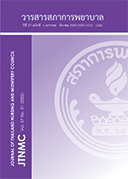การพยาบาลผู้สูงอายุที่มีการรู้คิดบกพร่องเล็กน้อย: การประยุกต์ทฤษฎีการตัดสินใจด้วยตนเอง
คำสำคัญ:
การปรับวิถีชีวิต, ทฤษฎีการตัดสินใจด้วยตนเอง, การพยาบาล, ผู้สูงอายุที่มี การรู้คิดบกพร่องเล็กน้อยบทคัดย่อ
การรู้คิดบกพร่องเล็กน้อยเป็นความผิดปกติของการทำหน้าที่ทางการรู้คิดที่อยู่ระหว่างการรู้คิดบกพร่องที่เกิดจากการเปลี่ยนแปลงตามกระบวนการสูงอายุและภาวะสมองเสื่อมซึ่งพบสูงขึ้นในผู้สูงอายุพยาบาลผู้สูงอายุมีบทบาทในการช่วยผู้สูงอายุปรับวิถีชีวิตเพื่อชะลอการเกิดภาวะสมองเสื่อม โดยการส่งเสริมให้มีกิจกรรมกายและปรับรูปแบบการรับประทานอาหารซึ่งผู้สูงอายุต้องปฏิบัติอย่างต่อเนื่องและเป็นเวลานานจึงจะสามารถช่วยชะลอการเกิดภาวะสมองเสื่อมได้อย่างไรก็ตามวิถีชีวิตเป็นสิ่งที่เปลี่ยนแปลงได้ยากเนื่องจากผู้สูงอายุปฏิบัติด้วยความเคยชินจนเป็นนิสัย ประกอบกับการมีความบกพร่องทางการรู้คิด ความจำและการตัดสินใจอาจทำให้ขาดแรงจูงใจในการปฏิบัติพฤติกรรมสุขภาพ การนำทฤษฎีการตัดสินใจด้วยตนเองมาประยุกต์ใช้โดยตอบสนองแรงจูงใจภายใน 3 ด้าน ได้แก่ 1) ความต้องการมีความสามารถโดยการให้ความรู้เกี่ยวกับภาวะสมองเสื่อมและฝึกทักษะการปรับวิถีชีวิต 2) ความต้องการมีความสัมพันธ์กับบุคคลอื่นโดยจัดกิจกรรมกลุ่มสัมพันธ์ และ 3) ความต้องการเป็นอิสระในตนเองโดยส่งเสริมให้ผู้สูงอายุมีอิสระในการตัดสินใจเลือกแนวปฏิบัติการปรับวิถีชีวิตด้วยตนเอง จะทำให้ผู้สูงอายุมีแรงจูงใจในการกำหนดพฤติกรรมสุขภาพ และปฏิบัติพฤติกรรมได้อย่างต่อเนื่อง ซึ่งในระยะยาวอาจช่วยชะลอการเกิดภาวะสมองเสื่อมได
Downloads
เอกสารอ้างอิง
Senanarong V, Harnphadungkit K, Poungvarin N, Vannasaeng S, Chongwisal S, Chakorn T, et al. The dementia and disability project in Thai elderly: rational, design, methodology and early results. BMC Neurol 2013;13(1):1-11.
SubindeeS,SritanyaratW.Mild cognitive impairment in older persons with chronic illness attended at a chronic care clinic of a primary care unit, Khon Kaen province. Journal of Nursing Science and Health 2014;37(1):43-50. (in Thai)
Griffths J, Thaikruea L, Wongpakaran N, Munkhetvit P. Prevalence of mild cognitive impairment in rural Thai older people, associated risk factors and their cognitive characteristics. Dement Geriatr Cogn Disord Extra 2020;10(1):38-45.
TangalosEG,PetersenRC.Mild cognitive impairment ingeriatrics. Clin GeriatrMed2018;34(4):563-89.
Petersen RC. Mild cognitive impairment. Continuum (Minneap Minn) 2016;22(2):404-8.
Carlozzi NE, ShermanCW, Angers K, Belanger MP, Austin AM, Ryan KA. Caring for an individual with mild cognitive impairment: a qualitative perspective of health-related quality of life from caregivers. Aging Ment Health 2018;22(9):1196-204
Gitlin LN, Maslow K, Khillan R. National research summit on care, services, and supports for persons with dementia and their caregivers. Report to the National Advisory Council on Alzheimer’s Research, Care, and Services 2018.
Kimura N, Aso Y, Yabuuchi K, Ishibashi M, Hori D, Sasaki Y, Nakamichi A, Uesugi S, Fujioka H, Iwao S, Jikumaru M. Modifable lifestyle factors and cognitive function in older people: a cross-sectional observational study.Front Neurol2019;10(1):1-12.
Kivipelto M, Mangialasche F, Ngandu T. Lifestyle interventions to prevent cognitive impairment, dementia and Alzheimer disease. Nat Rev Neurol 2018;14(11):653-66.
Forstmeier S, Maercker A. Motivational processes in mild cognitive impairment and Alzheimer’s disease: results from the Motivational Reserve in Alzheimer’s (MoReA) study. BMC psychiatry 2015;15(1):1-8.
Deci EL, Ryan RM. Conceptualizations of intrinsic motivation and self-determination. In Intrinsic motivation and self-determination in human behavior. Boston: Springer; 1985.
TuokkoHA,HultschDF.Mild cognitive impairment: international perspectives. New York: Psychology Press; 2020.
Subramanyam AA, Singh S. Mild cognitive decline: concept, types, presentation, and management. J Geriatr Psychiatry Neurol 2016;3(1):10-20.
Makino K, Lee S, Bae S, Shinkai Y, Chiba I, Shimada H. Relationship between instrumental activities of daily living performance and incidence of mild cognitive impairment among older adults: a 48-month follow-up study. Arch Gerontol Geriatr 2020;88(1):1-10
Wolfe CM, Fitz NF, Nam KN, Lefterov I, Koldamova R. The role of APOE and TREM2 in Alzheimer's disease—current understanding and perspectives. Int J Mol Sci 2019;20(1):1-20.
International Physical Activity Questionnaire Group. Guidelines for data processing and analysis of the international physical activity questionnaire - short and long forms. [Internet]. 2005 [cited 2020 Oct 18]. Available from http://www.ipaq.ki.se/scoring.pdf
Vancampfort D, Stubbs B, Lara E, Vandenbulcke M, Swinnen N, Koyanagi A. Mild cognitive impairment and physical activity in the general population: findings from six low-and middle-income countries. Exp Gerontol 2017;100(1):100-5.
Falck RS, Davis JC, & Liu-Ambrose T. What is the association between sedentary behaviour and cognitive function?: a systematic review. Br J Sports Med 2017;51(10):800-11.
Martínez RG, Jiménez AO, López AS, Ortega RM. Nutrition strategies that improve cognitive function. Nutr Hosp 2018;35(6):16-9.
Vauzour D, Camprubi-Robles M, Miquel-Kergoat S, Andres-Lacueva C, Bánáti D, Barberger-Gateau P, et al. Nutrition for the ageing brain: towards evidence for anoptimaldiet.Ageing Res Rev2017;35(1):222-40.
Barnard ND, Bunner AE, Agarwal U. Saturated and trans fats and dementia: a systematic review. Neurobiol Aging 2014;35(1):65-73.
Shakersain B. Impact of nutritional status and diet on cognitive decline and survival. [Internet]. 2016 [cited 2020 Oct 18]. Available from https://www. semanticscholar.org/paper/Impact-of-nutritionalstatus-and-diet-on-cognitive-Shakersain/
Hughes CF, Ward M, Tracey F, Hoey L, Molloy AM, Pentieva K, et al. B-vitamin intake and biomarker status in relation to cognitive decline in healthy older adults in a 4-year follow-up study. Nutrients 2017;9(1):53-67.
Wahl D, Solon-Biet SM, Cogger VC, Fontana L, Simpson SJ, Le Couteur DG, Ribeiro RV. Aging, life style and dementia. Neurobiol Dis 2019;130(1): 104-81.
Northey JM, Cherbuin N, Pumpa KL, Smee DJ, Rattray B. Exercise interventions for cognitive function in adults older than 50: a systematic review with meta-analysis. Br J Sports Med 2018;52(3): 154-60.
Tsai CL, Ukropec J, Ukropcová B, Pai MC. An acute bout of aerobic or strength exercise specifcally modifes circulating exerkine levels and neurocognitive functions in elderly individuals with mild cognitive impairment.NeuroImageClin2018;17(1):272-84.
McGrattan AM, McEvoy CT, McGuinness B, McKinley MC, Woodside JV. Effect of dietary interventions in mild cognitive impairment: a systematic review. Br J Nutr 2018;120(12):1388-405.
Guasch‐Ferré M, Willett WC. The Mediterranean diet and health: a comprehensive overview. J Intern Med 2021;209(1):549-566.
Fischer BL, Midden AJ, Hoffmann A, Urben D, DeWittL,KohlmanK,ShermanK,MyersS,ClemsonL, Mahoney JE.Stepping Out: Apilotprogram toreduce falls risk in people with mild cognitive impairment. OBM Geriatrics 2021;5(1):1-16.
Findsen B, Formosa M. Geragogy. In Lifelong learning in later life. Malta: Sense Publishers 2011.
ดาวน์โหลด
เผยแพร่แล้ว
รูปแบบการอ้างอิง
ฉบับ
ประเภทบทความ
สัญญาอนุญาต
ลิขสิทธิ์ (c) 2022 วารสารสภาการพยาบาล

อนุญาตภายใต้เงื่อนไข Creative Commons Attribution-NonCommercial-NoDerivatives 4.0 International License.








